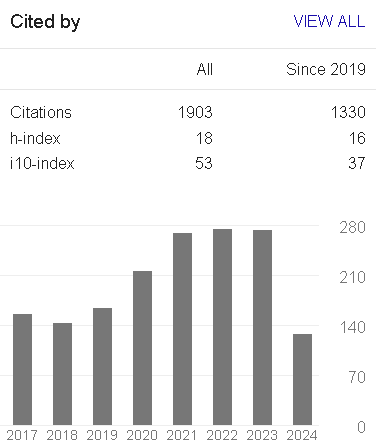Concurrency Control Technique in RFID Implementation
Keywords:
Radio Frequency Identification, Wireless sensor networks, Database Management, Concurrency Control, RFID tags, RFID readersAbstract
Database techniques have been used to proffer solution to some challenging situations that has to do with management of data in industries. This idea can also be valuable and implemented in managing the operation mode of some devices during the design level stage. The proposition of Radio Frequency Identification Detection technology as a convenient and automatic instrument of identification and detection has shown value in usage in the society. However, it has been identified with some challenges such as collision despite its prospects. The need to mitigate collision between a reader and multiple tags is of importance for effective deployment of the technology. The paper aimed at integrating one of the concepts of database management technique of concurrency control known as Time-Stamp (TS) in order to offer solution to the problem of collision in RFID implementation. This paper adopted a small scale business scenario which was used to illustrate the benefit this stands to offer in the real-life implementation. The paper concluded by arguing that this technique can be adopted and implemented and by such doing, will enhance further the performance of RFID technology.
References
Jechlitschek C,( 2006) A Survey Paper on Radio FrequencyIdentification (RFID) Trends Retreived on 29/11/2012 From file://X:www-docscse574-06ftprfidindex.html
Galhotra M.K&Lane M.S (2009) Application of radio frequency identification technology in Libraries.Journal of Library & Information Technology, 29(3),59-64.
Tian J., Wang X. & Zhang L. (2010) Design and application of the RFID technology in ERP. Computer and Information Science, 3(4) 264-267.
Kochar B. &Chhillar R. (2012) An effective data warehousing system for RFID using novel data cleaning, data transformation and loading techniques. The International Arab Information Technology, 9(3) 208-216.
Saxena M. & Doctor G. (2008) Radio frequency identification (RFID): Applications and Indian scenario. The Icfai University Journal of information Technology, 72-78.
Su X., Chu C, Prabhu B.S., Gadh R. (2007) On the creation of automatic identification and data capture infrastructure via RFID. Auerbach
Publications, Taylor & Francis Group. 24-43.
Ilie-zudor E., Kemeny Z., Egri P., Monostori L.(2006) The RFID technology and its current applications. In proceedings of the Modern Information Technology in the Innovation Processes of the Industrial Enterprise-MITP
Weis A.S (2012) RFID (Radio Frequency Identification): Principles and Applications. Retrieved on 12/11/2012 From:
. http://www.google.com.ng/url?sa=t&rct=j&q=&esrc=s&source=web&cd=1&ved=0CC8QFjAA&url=http%3A%2F 2Fciteseerx.ist.psu.edu%2Fviewdoc%2Fdownload%3Fdoi%3D10.1.1.182.5224%26rep
Downloads
Published
How to Cite
Issue
Section
License
Copyright (c) 2014 COMPUSOFT: An International Journal of Advanced Computer Technology

This work is licensed under a Creative Commons Attribution 4.0 International License.
©2023. COMPUSOFT: AN INTERNATIONAL OF ADVANCED COMPUTER TECHNOLOGY by COMPUSOFT PUBLICATION is licensed under a Creative Commons Attribution 4.0 International License. Based on a work at COMPUSOFT: AN INTERNATIONAL OF ADVANCED COMPUTER TECHNOLOGY. Permissions beyond the scope of this license may be available at Creative Commons Attribution 4.0 International Public License.


